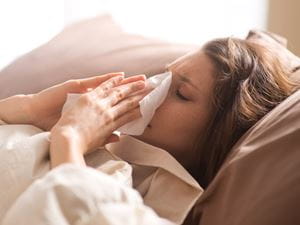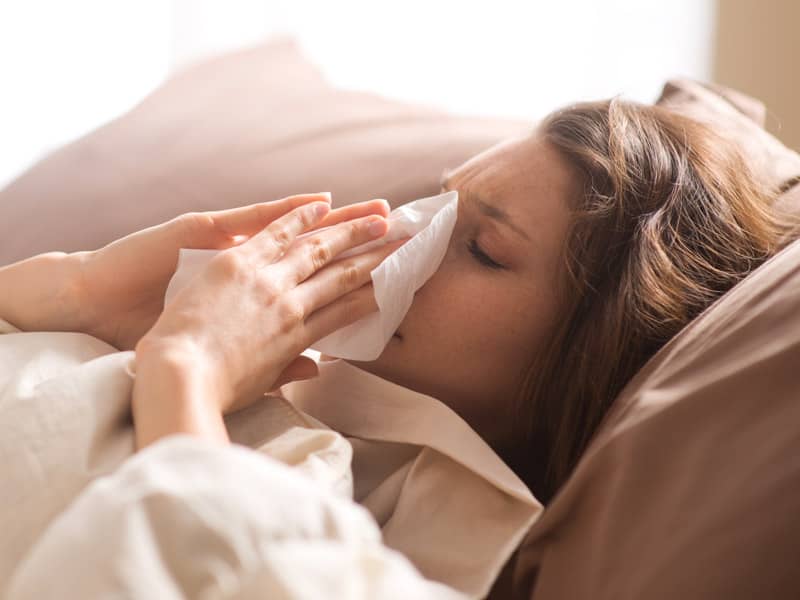
This fall is turning out to be a terrible season for viruses. The flu is spreading rapidly, COVID-19 still kills hundreds of people a day, and respiratory syncytial virus, or RSV, is surging. These viruses appear to be the same in those they infect, with similar symptoms, including fever, sneezing, coughing, and more, making things even harder.
Not being able to determine what illness you have makes the viruses dangerous. Certain sicknesses are more concerning for some populations. In particular, RSV is most common in children and hazardous for children. There are different ways to detect RSV, including at-home tests and tests at your doctor’s office. If you get tested, you’ll know that you have the virus, which gives you better tools to protect your loved ones and yourself. Here are some symptoms of RSV for healthy adults, children, and immunocompromised adults.
RSV symptoms for children.
RSV is frightening for children less than five, especially children less than two, according to Dr. Purva Grover, the medical director of the Cleveland Clinic’s emergency pediatric department. It’s a virus that can affect their respiratory system and their ability to breathe. However, doctors are noticing that RSV is starting to appear in children around ages eight to 10, which is also dangerous for children of that age group, something doctors haven’t seen in previous years.
The Centers for Disease Control and Prevention says that children with RSV might have congestion, cough, runny nose, fever, and a decreased appetite. Irritability is a common symptom in infants, along with a smaller desire to eat. These symptoms won’t happen all at once but at different times throughout the illness. RSV is ubiquitous in children, so common that the CDC says nearly all children will have had an RSV infection before turning two.
Some children get sick with RSV and recover, but that’s not the case for all. It becomes concerning when children have trouble breathing, like gasping for air or wheezing, which leads parents to bring them to the emergency room. Dr. Grover says that children come to the ER for three to four days after infection. The virus begins to peak, and the viral load is at its peak, causing parents to bring their children in for respiratory distress. Because children breathe so fast in attempts to breathe enough air, they end up dehydrated when dealing with RSV.
RSV symptoms in immunocompromised adults.
For adults, the most severe effects of RSV are seen in immunocompromised people, according to the chief of the infectious diseases division at Houston Methodist Hospital, Dr. Cesar Arias. Typically, people who fall into this category take immunosuppressive drugs, undergo chemotherapy, or receive bone marrow or organ transplants. In this case, the infection comes with flu-like symptoms that eventually progress into pneumonia.
Dr. Arias added that pneumonia symptoms change from person to person depending on how much they’re immunocompromised. It could be coughing or more severe symptoms where the respiratory status is impacted, which means the person can’t breathe. Dr. Arias also noted that people with a high risk of developing serious illnesses and seeing these symptoms are the people going to the hospital for treatment.
He emphasized that you might not be an organ transplant recipient or have cancer. Still, other chronic diseases like COPD, cardiac disease, and diabetes can put you at high risk for developing more serious RSV symptoms. Depending on your physiological reserve, a mild infection could push you over the edge. If you have lung or heart issues, RSV could be challenging for your body to cope with and could lead to heart attacks or other concerns linked to the trauma that respiratory infections put on your body.
RSV symptoms for healthy adults.
Adults with healthy immune symptoms don’t need to be too concerned about their health if they’re infected with RSV. Doctors haven’t seen increased hospitalizations in RSV infections for the non-immunocompromised population. Still, that doesn’t mean healthy adults aren’t getting sick or looking for medical attention from their primary care doctors.
For adults with healthy immune systems, symptoms are typically mild and look like a sinus infection or cold. Since RSV is an upper respiratory infection, healthy adults will have symptoms like congestion or a runny nose. Adults should also look out for chest pain, shortness of breath, and trouble taking deep breaths, which are common symptoms of RSV. They should also expect a sore throat, low-grade fever, and a cough.
Do what you can to protect yourself.
Healthy adults can fight RSV due to their robust immune systems, so their symptoms are typically mild. Still, a sniffle could be okay for you, but if it spreads, it could kill a child or older person. This is especially true for adults who are caregivers, people with weak immune systems, and loved ones of children.
Dr. Arias and Dr. Grover said to protect others and yourself, you should stay home if you’re sick, mask up in crowded places, wash your hands frequently, and ensure that you’re up to date on your vaccinations. For now, there’s no vaccine for RSV, but vaccines are in development. Getting tested if you have symptoms is also a good idea because you’ll know what kind of virus you have and the best treatment plan—one test checks for COVID-19, RSV, and the flu.
It pays to be vigilant because these three potentially deadly and highly contagious viruses rapidly spread. For RSV, everyone should be considered carriers. Regarding RSV, symptoms look different in healthy adults, children, and immunocompromised adults. When it comes to children and RSV, the virus is so common in children that most children will have an RSV infection before they turn two.
With these three viruses circulating simultaneously, you should do everything you can to protect your loved ones and yourself, especially immunocompromised adults and children. When you’re in crowded areas, don’t be afraid to mask up and continue to practice hand hygiene, meaning wash your hands frequently and use hand sanitizer when needed. Your top priority is keeping yourself and your loved ones safe, so don’t be afraid to do what’s necessary.

